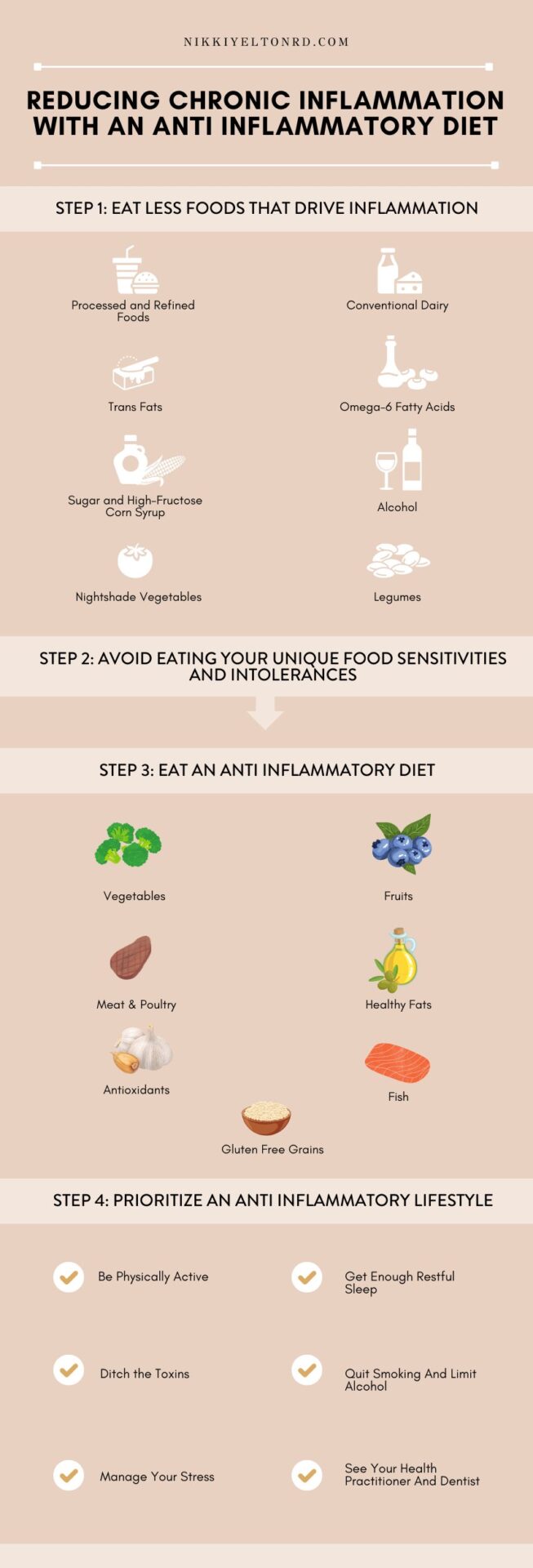Living with autoimmune conditions often means battling inflammation and reactivity on a daily basis. This struggle can significantly impact your overall well-being and nutritional choices. Fortunately, personalized nutrition offers a transformative approach to managing these challenges effectively. By tailoring your dietary habits to fit your unique health profile, you can combat inflammation more efficiently and regain control over your health. Embracing personalized nutrition empowers you to make informed decisions that could lead to a remarkable improvement in your quality of life.
Understanding Autoimmune Conditions and Their Impact on Nutrition
Autoimmune conditions occur when the immune system mistakenly attacks healthy cells in the body. This reactive behavior leads to a wide range of symptoms, such as fatigue, pain, and inflammation. Consequently, these conditions can significantly impact nutritional needs and dietary choices.
Here’s how autoimmune conditions interact with nutrition:
- Nutritional Deficiencies: Many people with autoimmune diseases struggle with nutrient absorption due to inflammation in the gut. This can lead to deficiencies in essential vitamins and minerals, such as vitamin D, B12, and iron.
- Increased Inflammation: Certain foods can exacerbate inflammation, worsening symptoms. Thus, individuals managing autoimmune conditions must identify which foods trigger inflammatory responses.
- Personalized Nutrition: This approach tailors meal plans to an individual’s specific needs, considering their unique reactions to foods. By focusing on personalized nutrition, those with autoimmune conditions can better support their bodies in combating inflammation.
- Immune Response: Diet plays a crucial role in modulating the immune response. Whole foods, rich in antioxidants and healthy fats, can promote healing, while processed foods may aggravate the symptoms.
By appreciating these factors, individuals can make informed dietary choices that not only support their immune health but also enhance their quality of life through personalized nutrition. A strategic approach empowers those with autoimmune conditions to navigate their unique dietary landscape effectively.

The Role of Inflammation in Autoimmune Diseases
Inflammation plays a pivotal role in autoimmune diseases, acting as both a symptom and a driver of the condition. When the body’s immune system mistakenly attacks its own cells, it triggers an inflammatory response. Understanding this process is essential for anyone looking to manage their condition through personalized nutrition.
Key aspects of inflammation in autoimmune diseases include:
- Chronic Inflammation: Persistent inflammation can lead to tissue damage and exacerbate symptoms, leading to a cycle of worsening health.
- Inflammatory Markers: Elevated levels of specific markers, like C-reactive protein (CRP), indicate ongoing inflammation and can guide your nutritional approach.
- Food and Inflammation: Certain foods can either promote or reduce inflammation in the body. Tailoring your diet through personalized nutrition helps identify which foods contribute to your inflammatory response.
To illustrate the impact of diet on inflammation, consider the following comparison:
| Food Type | Inflammatory Potential | Best Practices for Reduction |
|---|---|---|
| Processed Sugars | High | Limit intake, opt for natural sweeteners |
| Omega-6 Fatty Acids | Moderate | Balance with Omega-3 sources |
| Lean Proteins | Low | Include in daily meals |
By optimizing your diet with personalized nutrition, you can effectively navigate the challenges of inflammation in autoimmune diseases. This approach empowers you to take charge of your health, fostering a path toward reduced symptoms and enhanced well-being.
Personalized Nutrition: A Key to Managing Inflammation
Personalized nutrition stands at the forefront of managing inflammation in autoimmune conditions. By tailoring dietary approaches to individual needs, you can significantly influence your body’s inflammation levels and overall health. Here’s how personalized nutrition can make a difference:
Key Benefits of Personalized Nutrition in Managing Inflammation
- Addresses Specific Needs: Everyone’s body reacts differently to certain foods. Personalized nutrition takes into account unique metabolic responses and dietary preferences, ensuring that your meal plan enhances your well-being.
- Reduces Inflammatory Markers: Studies indicate that a customized diet can lower markers of inflammation such as C-reactive protein (CRP), leading to improved symptoms in autoimmune conditions.
- Enhances Nutrient Absorption: Tailoring your nutrition helps the body absorb essential vitamins and minerals more effectively, thereby supporting a robust immune response.
Personalized Nutrition vs. One-Size-Fits-All Diets
| Feature | Personalized Nutrition | One-Size-Fits-All Diets |
|---|---|---|
| Individualized Plans | Yes | No |
| Targeted Nutrient Approach | Yes | No |
| Flexibility | High | Low |
| Effectiveness | Generally higher | Variable |
In conclusion, embracing personalized nutrition not only empowers you to manage inflammation more effectively but also fosters a deeper connection with your food choices, ultimately enhancing your quality of life while navigating the complexities of autoimmune conditions.
Identifying Food Sensitivities and Allergies
Identifying food sensitivities and allergies is crucial for individuals with autoimmune conditions, as certain foods can significantly trigger inflammation and worsen symptoms. Personalized nutrition plays a vital role in this process, allowing individuals to tailor their diets to their specific needs.
Steps to Identify Food Sensitivities:
- Keep a Food Journal: Document everything you consume alongside any symptoms you experience. This will help you spot patterns and potential triggers.
- Elimination Diet: Gradually remove common allergens such as gluten, dairy, and nuts from your diet for a few weeks. Then, reintroduce them one at a time while monitoring your body’s reaction.
- Consult a Professional: Consider working with a nutritionist who specializes in personalized nutrition for autoimmune conditions. They can guide you through the elimination diet and ensure you maintain a balanced intake.
Common Food Sensitivities:
| Food Type | Possible Reaction |
|---|---|
| Dairy | Inflammation, digestive issues |
| Gluten | Bloating, fatigue, joint pain |
| Nightshades | Inflammation, increased pain levels |
| Soy | Digestive discomfort, skin reactions |
| Eggs | Inflammation, potential respiratory issues |
Understanding your body’s unique reactions through personalized nutrition enables you to create a diet that minimizes inflammation. By identifying food sensitivities and allergies, you take a critical step towards managing your autoimmune condition effectively.

The Importance of an Anti-Inflammatory Diet
An anti-inflammatory diet is crucial for individuals with autoimmune conditions, as it directly impacts the body’s inflammatory response. By emphasizing personalized nutrition, this type of diet helps to reduce symptoms and promote overall health. Here’s why it’s essential:
- Reduces Inflammation: Foods rich in antioxidants, Omega-3 fatty acids, and polyphenols actively combat inflammation. Incorporating items like:
- Fatty fish (salmon, mackerel)
- Leafy greens (spinach, kale)
- Nuts and seeds (walnuts, chia seeds)
- Supports Immune Function: A well-structured anti-inflammatory diet boosts the immune system, helping your body to better manage or even prevent autoimmune flare-ups.
- Improves Digestion: Including fiber-rich foods such as whole grains, fruits, and legumes can enhance gut health, which is linked to a balanced immune response.
- Encourages Weight Management: Maintaining a healthy weight through personalized nutrition can further decrease inflammation. Excess body fat produces pro-inflammatory cytokines that can worsen autoimmune conditions.
Here’s a quick comparison of foods to include versus those to avoid:
| Foods to Include | Foods to Avoid |
|---|---|
| Fresh fruits and vegetables | Processed foods |
| Whole grains | Refined sugars |
| Healthy fats (olive oil) | Trans fats |
| Lean proteins (chicken, tofu) | Saturated fats |
Embracing an anti-inflammatory diet personalized to your needs can significantly enhance your quality of life and provide an effective strategy to navigate autoimmune challenges.
Nutritional Supplements to Consider for Autoimmune Health
When managing autoimmune conditions, personalized nutrition becomes even more impactful when paired with specific nutritional supplements. These can help address deficiencies, reduce inflammation, and support overall health. Here are some key supplements to consider:
- Omega-3 Fatty Acids: Known for their anti-inflammatory properties, omega-3s, found in fish oil, can help reduce joint pain and stiffness.
- Vitamin D: Many individuals with autoimmune diseases are deficient in vitamin D. Supplementing can enhance immune function and help regulate inflammation.
- Curcumin: This powerful compound in turmeric boasts strong anti-inflammatory effects. It can potentially alleviate symptoms of autoimmune conditions.
- Probiotics: A healthy gut microbiome is crucial for autoimmune health. Probiotics can promote gut health, which, in turn, supports immune regulation.
- Magnesium: Often overlooked, magnesium plays a vital role in reducing inflammation and is foundational for many bodily functions.
Comparison of Selected Supplements
| Supplement | Primary Benefit | Recommended Source |
|---|---|---|
| Omega-3 | Reduces inflammation | Fish oil or flaxseed oil |
| Vitamin D | Supports immune function | Fatty fish, fortified foods |
| Curcumin | Alleviates inflammation | Turmeric root or capsules |
| Probiotics | Promotes gut health | Yogurt or probiotic capsules |
| Magnesium | Reduces inflammation | Leafy greens or supplements |
Integrating these supplements into your personalized nutrition plan can provide substantial benefits, ultimately leading to improved health and well-being. Always consult with a healthcare professional before starting any supplement regimen to ensure it aligns with your individual health needs.
How to Create a Personalized Meal Plan for Autoimmunity
Crafting a personalized meal plan for managing autoimmune conditions requires a thoughtful approach tailored to your unique needs. Here are key steps to help you create an effective plan:
- Identify Trigger Foods: Start by keeping a food diary for a few weeks. Monitor how different foods affect your symptoms. Common triggers may include gluten, dairy, and certain food additives.
- Emphasize Whole Foods: Focus on fresh fruits, vegetables, lean proteins, and healthy fats. These nutrient-dense foods support your immune system and reduce inflammation.
- Incorporate Anti-Inflammatory Ingredients: Include ingredients known for their anti-inflammatory properties, such as:
- Turmeric
- Ginger
- Berries
- Green leafy vegetables
- Fatty fish (e.g., salmon)
- Balance Macronutrients: Ensure your meals contain a healthy balance of carbohydrates, proteins, and fats. A ratio like 40% carbohydrates, 30% proteins, and 30% fats can be beneficial, but adjust as necessary.
- Plan for Variety: Avoid monotony in your meals by including a wide range of foods. This not only keeps your diet interesting but also helps ensure you receive various nutrients.
- Monitor and Adjust: As you implement your meal plan, continuously track your symptoms and energy levels. Be prepared to make adjustments based on your findings to optimize your personalized nutrition strategy.
By following these steps, you can create a personalized meal plan that supports your autoimmune health and enhances your well-being.

The Connection Between Gut Health and Autoimmune Conditions
Maintaining optimal gut health is crucial for effectively managing autoimmune conditions. Recent studies demonstrate a strong link between gut health and the immune system. A balanced gut microbiome fosters a robust immune response, while imbalances can lead to increased inflammation and autoimmunity. Here’s how personalized nutrition plays a pivotal role:
- Gut Microbiome Diversity: A diverse range of gut bacteria is essential for maintaining a healthy immune system. Personalized nutrition can help tailor your diet to include foods that promote this diversity.
- Inflammation Management: Certain foods can either exacerbate or alleviate inflammation. By identifying and eliminating inflammatory foods through personalized nutrition, individuals may significantly reduce their autoimmune symptoms.
- Nutrient Absorption: Conditions like celiac disease or irritable bowel syndrome can hinder nutrient absorption. A customized approach to nutrition ensures you receive essential vitamins and minerals to support your immune health.
- Food Sensitivities: Many individuals with autoimmune disorders experience food sensitivities. Personalized nutrition helps pinpoint these triggers, optimizing your dietary choices for better gut health.
In summary, prioritizing gut health through personalized nutrition not only improves autoimmune symptoms but also enhances overall well-being. By understanding this connection, you empower yourself to take control of your health journey.
Hydration: Its Role in Inflammation and Immune Function
Proper hydration plays a crucial role in managing inflammation, especially for those with autoimmune conditions. When your body receives adequate fluids, it operates more efficiently, which directly supports immune function. Here’s why staying hydrated is essential for a health-focused approach like personalized nutrition:
- Cleansing Mechanism: Water assists in flushing out toxins that may trigger inflammation.
- Nutrient Absorption: Adequate hydration enhances the absorption of nutrients essential in a personalized nutrition plan, ensuring your body gets what it needs to combat autoimmune challenges.
- Cell Function: Hydration maintains the structure and function of cells, helping them respond effectively to inflammatory signals.
In fact, studies show that dehydration can exacerbate inflammatory responses, making it vital to drink enough fluids throughout the day. Consider these hydration tips:
- Drink Water Regularly: Aim for at least 8-10 glasses a day, adjusting for activity level and climate.
- Monitor for Signals: Thirst, dry skin, and fatigue can signal dehydration.
- Incorporate Hydrating Foods: Foods like cucumbers, oranges, and soups contribute to your daily hydration needs.
In conclusion, prioritizing hydration within your personalized nutrition plan can significantly enhance your overall health, reduce inflammation, and support immune function, making it an essential component for those navigating autoimmune conditions.
Success Stories: How Personalized Nutrition Transformed Lives
The power of personalized nutrition is evident in the transformative journeys of individuals managing autoimmune conditions. These success stories showcase how tailored dietary approaches can significantly enhance quality of life and reduce symptoms. Here are a few inspiring examples:
- Case Study 1: Sarah’s Journey with Hashimoto’s Thyroiditis
- After struggling with fatigue and weight fluctuations, Sarah embraced personalized nutrition. By identifying her specific food sensitivities and incorporating anti-inflammatory foods, she felt energized and achieved hormonal balance.
- Case Study 2: Mark’s Rheumatoid Arthritis Relief
- Mark found significant pain relief through personalized nutrition. By focusing on omega-3 rich foods and eliminating inflammatory agents, he reduced swelling and increased mobility, improving his overall health.
- Case Study 3: Emma’s Battle with Lupus
- Emma discovered that a highly personalized approach helped decrease her flare-ups. Utilizing a tailored diet rich in antioxidants and beneficial nutrients, she experienced notable improvements in her skin health and energy levels.
These stories reflect how personalized nutrition can lead to life-altering changes by addressing individual needs, promoting wellness, and reducing inflammation. By investing time and effort into understanding dietary triggers and preferences, many individuals have successfully regained control over their health. In a world where one-size-fits-all diets often fall short, personalized nutrition emerges as a beacon of hope for those battling autoimmune conditions.

Tips for Staying Committed to Your Nutrition Plan
Staying committed to a nutrition plan tailored for autoimmune conditions can be challenging, but with the right strategies, you can maintain motivation and consistency. Here are some effective tips to help you stick to your personalized nutrition journey:
- Set Realistic Goals: Begin with achievable targets. This could be trying a new recipe weekly or increasing your intake of anti-inflammatory foods.
- Meal Prep: Invest time in preparing meals in advance. Prepping helps eliminate last-minute unhealthy choices and ensures you have access to nutritious, personalized nutrition options.
- Stay Informed: Keep learning about how specific foods affect your autoimmune condition. The more knowledgeable you become, the more motivated you’ll be to make informed decisions.
- Connect with Community: Surround yourself with like-minded individuals. Joining groups focused on personalized nutrition can provide support, share success stories, and offer accountability.
- Track Your Progress: Document your food intake and health changes. A journal can help you identify what works best for your body, making it easier to stay committed.
- Practice Mindfulness: Incorporate mindfulness into your eating habits. Focus on enjoying your meals, which can deepen your appreciation for personalized nutrition and foster healthier habits.
By embracing these strategies, you can enhance your dedication to your personalized nutrition plan, ultimately leading to improved well-being and resilience against inflammation in autoimmune conditions. Stay committed and witness the transformative power of nutrition!
Frequently Asked Questions
What is personalized nutrition and how does it benefit those with autoimmune conditions?
Personalized nutrition is an individualized approach to dietary planning that considers a person’s unique genetic makeup, lifestyle factors, and health conditions, particularly autoimmune issues. For individuals grappling with autoimmune diseases, personalized nutrition can help reduce inflammation, boost immunity, and promote overall health. By tailoring dietary choices to specific needs, individuals can often identify potential food triggers, optimize nutrient intake, and improve symptom management, fostering a more balanced and healthier life.
How can I identify food triggers relating to my autoimmune condition?
Identifying food triggers requires a systematic approach. Start by keeping a detailed food diary logging everything you eat and drink, along with any symptoms experienced afterward. An elimination diet, where common allergens and inflammatory foods are removed for several weeks, followed by gradual reintroduction, can also be beneficial. Consulting with a nutritionist experienced in autoimmune conditions can provide additional support and personalized strategies, helping you pinpoint specific foods that may exacerbate your symptoms.
Are there specific diets recommended for autoimmune conditions?
Certain diets have gained popularity among those with autoimmune conditions, including the Autoimmune Protocol (AIP) diet, Mediterranean diet, and anti-inflammatory diets. Each of these diets emphasizes whole, nutrient-dense foods while eliminating common allergens and inflammatory ingredients. The AIP diet, for example, focuses on nutrient-rich foods to support immune health while avoiding grains, legumes, dairy, and processed foods. However, it’s essential to work with a healthcare professional to determine the best dietary plan tailored to your individual needs.
How does inflammation play a role in autoimmune conditions?
Inflammation is a crucial factor in the progression of autoimmune conditions. In a healthy immune response, inflammation helps fight infections and heal injuries; however, in autoimmune diseases, the immune system mistakenly attacks healthy tissues, resulting in chronic inflammation. This ongoing inflammatory response can worsen symptoms and lead to further complications. By adopting personalized nutrition strategies aimed at reducing inflammation—such as incorporating anti-inflammatory foods and avoiding triggers—individuals can help manage their autoimmune conditions more effectively.
What role do supplements play in managing autoimmune conditions?
Supplements can play a supportive role in managing autoimmune conditions, providing essential vitamins and minerals that may be lacking due to dietary restrictions or absorption issues. Common supplements include vitamin D, omega-3 fatty acids, probiotics, and antioxidants. However, it is crucial to consult a healthcare professional before starting any supplements, as they can interact with medications or may not be appropriate for every individual. A personalized assessment can help determine which supplements, if any, can complement your nutritional approach.
Please click here to buy Autoimmune Supplements from Amazon.
